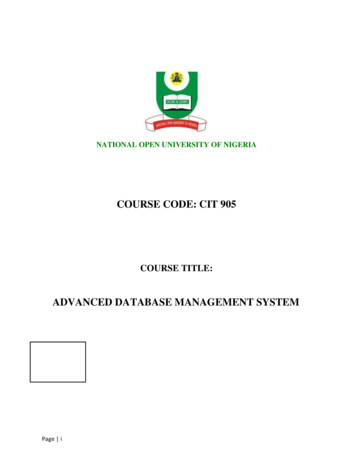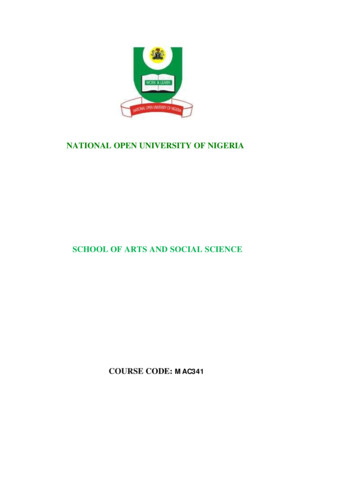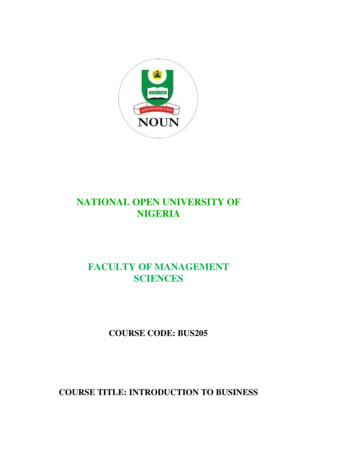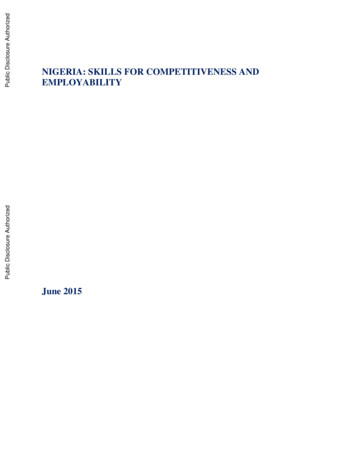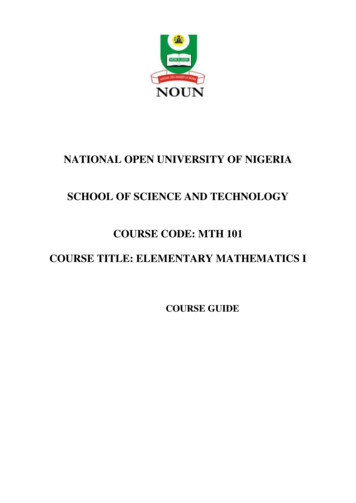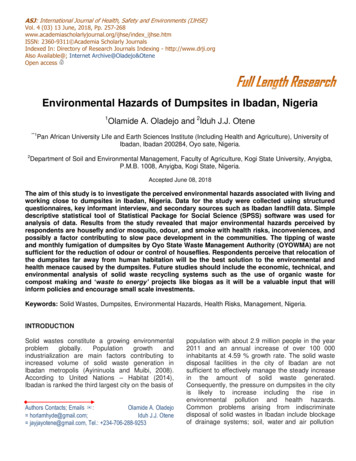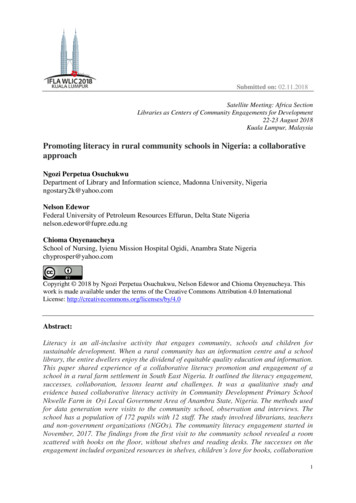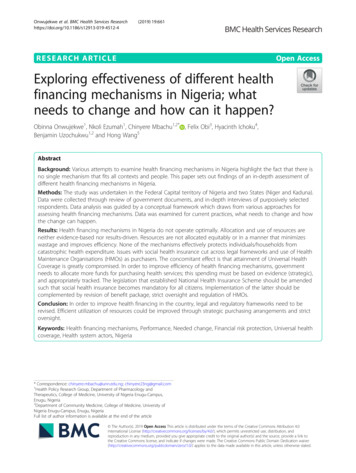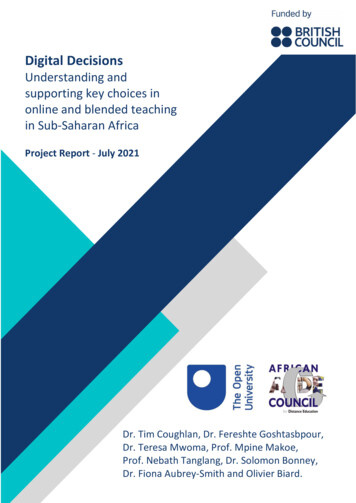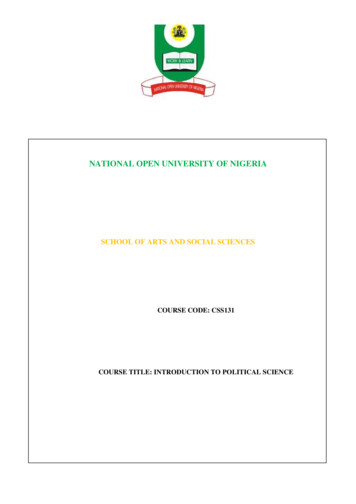
Transcription
NATIONAL OPEN UNIVERSITY OF NIGERIASCHOOL OF ARTS AND SOCIAL SCIENCESCOURSE CODE: CSS131COURSE TITLE: INTRODUCTION TO POLITICAL SCIENCE
CSS 131COURSE GUIDECOURSEGUIDECSS131INTRODUCTION TO POLITICAL SCIENCECourse DeveloperDr. Derin K. OlogbenlaUniversity Of LagosAkoka – Lagos.Course WriterDr. Derin K. OlogbenlaUniversity Of LagosAkoka – Lagos.Course Co-ordinatorDr. Godwin Ifidon OyakhiromenNational Open University of NigeriaLagos.NATIONAL OPEN UNIVERSITY OF NIGERIAiii
CSS 131COURSE GUIDENational Open University of NigeriaHeadquarters14/16 Ahmadu Bello WayVictoria IslandLagosAbuja Annex245 Samuel Adesujo Ademulegun StreetCentral Business DistrictOpposite Arewa SuitesAbujae-mail: centralinfo@nou.edu.ngURL: www.nou.edu.ngNational Open University of Nigeria 2006First Printed 2006ISBN: 978-058-434-XAll Rights ReservedPrinted by Goshen Print Media LtdForNational Open University of Nigeriaiii
CSS 131COURSE ing through the Course.Course Materials.Study Units.Textbooks and References.Assessment.Tutor Marked Assignments (TMA).Final Examination and Grading.Course Marking Scheme.Course Overview/Presentation Schedule.How to get the most from this Course.Tutors and Tutorials.Summary.Reference/Further Reading.112222-3333-4444-55-777-88iii
CSS 131INTRODUCTION TO POLITICAL SCIENCEINTRODUCTIONWelcome to CSS 131: Introduction to Political Science.This Course guide provides you with the various topics on theintroductory course in Political Science. It is prepared for students inthe first year study in Criminology and Security Studies, and Law in theNational Open University of Nigeria (NOUN).Political Science is the modern discipline for the study of politics andpolitical processes and the organization of the state. Traditionally,Political Science has often been studied by means of volume and verylarge textbooks; this guide provides the student with conciseunderstanding of the basic principles and focuses on views that aregermane in the study of Political Science.To study this course, and the various units, you need to be ready to thinkcritically and analytically. You need to develop a constructive minds tobe able to weigh different arguments carefully, trying to determinewhich arguments you find most plausible convincing and why. This isto enable you decipher properly which positions you would like to takewithout being a “copy-cat” student. If it is by understanding differentpositions that one can develop one’s ability to do the same.In this introductory section, aims and objectives will be explained. Themodule provides some useful advice on the reading system, the role inusing the course guide, the structure of the module, and guidance andpreparing for the assessment. It is important that one understands allthese at the beginning, to ensure that one is able to get the most out ofthe course and do the best one can.AIMSa) To be able to demonstrate an understanding and knowledge ofpolitical processes in modern states.b) To outline and critically analyse viewpoints in political sciencec) To apply the main theories, and concepts used in the study of politicsto the analysis of key institutions of the modern state.d) To critically evaluate different concepts, principles, theories,ideologies, etc.1
CSS 131INTRODUCTION TO POLITICAL SCIENCEOBJECTIVES(i)(ii)(iii)(iv)To introduce you to what politics and political science are allabout.To put you through the various methods political scientist uses tomake decisions and to make projections covering political eventsor phenomenon.To highlight the major areas within Political Science as a field ofstudy and show how these relates to other subjects in the SocialSciences.To show you that all activities of government affect our lives andthat politics is very important in every society.WORKING THROUGH THIS COURSETo complete this course, you are advised to check the study units, readthe recommended books as well as other course materials provided byNOUN. Each unit contains Self-Assessment Exercises (SAE) and TutorMarked Assignments (TMAS) for assessment purposes. There will be awritten examination at the end of the course. The course should take youabout 14 weeks to complete. You will find all the components of thecourse listed below. You need to allocate time to each unit so as tofinish the course successfully and on time.COURSE MATERIALSFor this course, you will require the following materials:1)2)3)4)5)The course guide;Study units which are fifteen (15) in all;Textbooks recommended at the end of the units; andAssignment file where all the unit assignments are kept.Presentation ScheduleSTUDY UNITSThere are fifteen study units in this course broken into 3 modules of 5units each. They are as follows:Module 1Unit 1:Unit 2:Unit3:Unit 4:2The Nature and Scope of Political ScienceThe Subject Matter of Political ScienceApproaches to the study of political science: TheLegalisticApproachThe Behavioural Approach to the study of Politics
CSS 131INTRODUCTION TO POLITICAL SCIENCEUnit 5:The nature, purpose and functions of the modern stateModule 2Unit 1:The Concept of SovereigntyUnit 2:Unit 3:Unit 4:Power and AuthorityLegitimacy and InfluencePolitical Ideas and MovementsUnit 5:ConstitutionModule 3Unit 1:Unit 2:Unit 3:Unit 4:Unit 5:ConstitutionalismPolitics and Social Change: Reforms, Revolutions andMilitary CoupsThe Nature of African ArmiesPublic AdministrationInternational Relations and OrganizationsEach unit contains some exercises on the topic covered, and you will berequired to attempt the exercises. These will enable you evaluate yourprogress as well as reinforce what you have learned so far. Theexercises, together with the tutor marked assignments will help you inachieving the stated learning objectives of the individual units, and thecourse.TEXTBOOKS AND REFERENCESYou may wish to consult the references and other books suggested at theend of each unit, to enhance your understanding of the material. Thiswill enhance your understanding of the material.ASSESSMENTYour assessment for this course is in two parts. First, are the tutormarked assignments, and second is a written examination. You will berequired to apply the information and knowledge gained from thiscourse in completing your assignments. You must submit yourassignments to your tutor in line with submission deadlines as stated inthe assignment file. The work that you submit to your tutor-markedassignment for assessment will count for 30% of your total score.TUTOR MARKED ASSIGNMENTS (TMAs)In this course, you will be required to study fifteen (15) units, andcomplete Tutor Marked- Assignment, provided at the end of each unit.3
CSS 131INTRODUCTION TO POLITICAL SCIENCEThe assignments carry 10% marks each. The best four of yourassignments will constitute 30% of your final mark. At the end of thecourse, you will be required to write a final examination, which countsfor 70% of your final mark.The assignments for each unit in this course are contained in yourassignment file. You may wish to consult other related materials apartfrom your course material to complete your assignments. When youcomplete each assignment, send it together with a Tutor MarkedAssignment (TMA) form to your tutor. Ensure that each assignmentreaches your tutor on or before the deadline stipulated in the assignmentfile. If, for any reason you are unable to complete your assignment intime, contact your tutor before the due date to discuss the possibility ofan extension. Note that extensions will not be granted after the due datefor submission unless under exceptional circumstances.FINAL EXAMINATION AND GRADINGThe final examination for this course will be for duration of two hours,and count for 70% of your total mark. The examination will consist ofquestions, which reflect the information in your course material,exercises, and tutor marked assignments. All aspects of the course willbe examined. Use the time between the completion of the last unit, andexamination date to revise the entire course. You may also find it usefulto review your tutor marked assignments before the examination.COURSE MARKING SCHEMEASSESSMENTMARKSAssignmentsFour assignments, best three marks of thefour count at 30% of course marksFinal Examination70% of total course markTotal100% of course marksCOURSE OVERVIEWYour assignment file consists of all the details of the assignments youare required to submit to your tutor for marking. The marks obtained forthese assignments will count towards the final mark you obtain for thiscourse. More information on the assignments can be found in theassignment file.4
CSS 131INTRODUCTION TO POLITICAL SCIENCECourse Overview and Presentation ScheduleModule 112345Module 2Unit12345Module 3Unit12345161718Title of WorkThe Nature and Scope of PoliticalScienceThe Subject Matter of PoliticalScienceApproaches to the study of politicalscience: The Legalistic ApproachThe Behavioural Approach to thestudy of PoliticsThe nature, purpose and functions ofthe modern stateThe Concept of SovereigntyPower and AuthorityLegitimacy and InfluencePolitical Ideas and MovementsConstitutionConstitutionalismPolitics and Social Change: Reforms,Revolutions and Military CoupsThe Nature of African ArmiesPublic AdministrationInternational Relations andOrganizationsRevisionExaminationsTotalWeeks AssessmentActivity (End of Unit)Week 1Week 2Week 3Assignment 1Week 4Week 5Week 6Assignment 2Week 7Week 8Week 9Week 10Week 11Assignment 3Week 12Week 13Week 14Week 15Assignment 4Week 16Week 1717 weeksHOW TO GET THE MOST FROM THIS COURSEIn distance learning, your course material replaces the lecturer. Thecourse material has been designed in such a way that you can study onyour own with little or no assistance at all. This allows you to work, andstudy at your pace, and at a time and place that best suits you. Think ofreading your course material in the same way as listening to the lecturer.However, you are advised to study with your course mates. In the sameway a lecturer might give you some reading to do, the study units giveyou information on what to read, and these form your text materials.Youare provided exercises to do at appropriate points, just as a lecturermight give you an in-class exercise.Each of the study units follow a common format. The first item is anintroduction to the subject matter of the unit, and how a particular unitis integrated with the other units and the course as a whole. Next to this,5
CSS 131INTRODUCTION TO POLITICAL SCIENCEis a set of learning objectives. These objectives let you know what youare required to know by the time you have completed the unit. Theselearning objectives are meant to guide your study. The moment a unit isfinished, you must go back and check whether you have achieved theobjectives. If you make this a habit, it will improve your chances ofpassing the course significantly.The main body of the unit guides you through the required reading fromother sources. This will usually be either from the reference books orfrom a Reading section.The following is a practical strategy for working through the course. Ifyou run into any difficulties, telephone your tutor. Remember that yourtutor’s job is to help you. When you need assistance, do not hesitate tocall and ask your tutor for help or visit the study centre.Read this Course Guide thoroughly, it is your first assignment.1. Organize a Study Schedule. Design a ‘Course Overview’ to guideyou through the course. Note the time you are expected to spend oneach unit and how the assignments relate to the units. You need togather all the information into one place, such as your diary or a wallcalendar. Whatever method you choose to use, you should decideand write in your own dates and schedule of work for each unit.2. Once you have created your own study schedule, do everything to befaithful to it. The major reason students fail is that they get behindwith their course work. If you get into difficulties with yourschedule, please, let your tutor know before it is too late for help.3. Turn to Unit 1, and read the introduction and the objectives for theunit.4. Assemble the study materials. You will need the reference books inthe unit you are studying at any point in time.5. Work through the unit. As you work through the unit, you will knowwhat sources to consult for further information.6. Before the relevant due dates (about 4 weeks before due dates),access the Assignment File. Keep in mind that you will learn a lotby doing the assignment carefully. They have been designed to helpyou meet the objectives of the course and, therefore, will help youpass the examination. Submit all assignments not later than the duedate.7. Review the objectives for each study unit to confirm that you haveachieved them. If you feel unsure about any of the objectives, reviewthe study materials or consult your tutor.8. When you are confident that you have achieved a unit’s objectives,you can start on the next unit. Proceed unit by unit through the6
CSS 131INTRODUCTION TO POLITICAL SCIENCEcourse and try to pace your study so that you keep yourself onschedule.9. When you have submitted an assignment to your tutor for marking,do not wait for its return before starting on the next unit. Keep toyour schedule. When the Assignment is returned, pay particularattention to your tutor’s comments, both on the tutor-markedassignment form and also the written comments on the ordinaryassignments.10. After completing the last unit, review the course and prepare yourselffor the final examination. Check that you have achieved the unitobjectives (listed at the beginning of each unit) and the courseobjectives (listed in the Course Guide).TUTORS AND TUTORIALSThere are 15 hours of tutorials provided to support this course. Tutorialsare for problem solving, and they are optional. You need to get in touchwith your tutor to arrange date and time for tutorials if needed. Yourtutor will mark and comment on your assignments, keep a close watchon your progress and on any difficulties you might encounter andprovide assistance to you during the course. You must submit yourtutor-marked assignments to your tutor well before the due date (at leasttwo working days are required). They will be marked by your tutor andreturned to you as soon as possible.Do not hesitate to contact your tutor by telephone, e-mail, or discussionboard. The following might be circumstances in which you will findhelp necessary. Contact your tutor if You do not understand any part of the study units or the assignedreadings. You have difficulties with the exercises. You have a question or problem with an assignment, with yourtutor’s comments on an assignment or with the grading of anassignment.To gain the maximum benefits from course tutorials, prepare a questionlist before attending them. You will learn quite a lot from participatingin the discussions.SUMMARYThe course guide has introduced you to what to expect in Introduction toPolitical Science. It examines the nature and scope of political science,approaches to the study of political science, concept of a modern state,sovereignty, power and authority, legitimacy and influence. The course7
CSS 131INTRODUCTION TO POLITICAL SCIENCEalso discusses the constitution and constitutionalism, the role of politicsin social change, nature of African armies, public administration, andinternational relations. Upon completion you should be equipped withthe foundation for analyzing and researching political issues.We wish you success with the course and hope you will find it bothengaging and practical.REFERENCES/FURTHER READINGAnifowoshe R. and Francis Enemuo, (ed.) 1999.Elements of Politics,Lagos: Malthouse Press Ltd.,Ologbenla, D. K. 1996. Introduction to Political Science, Lagos: OlucityPress Ltd.Nnoli O. 1986. Introduction to Politics, Lagos: Longman Nigeria Ltd.8
CSS 131INTRODUCTION TO POLITICAL SCIENCEMAINCOURSECourse CodeCSS 131Course TitleIntroduction to Political ScienceCourse DeveloperDr. Derin K. OlogbenlaUniverisity of LagosAkoka – Lagos.Course WriterDr. Derin K. OlogbenlaUniversity of LagosAkoka – Lagos.Course CoordinatorDr. Godwin Ifidon OyakhiromenNational Open University of NigeriaLagos.9
CSS 131INTRODUCTION TO POLITICAL SCIENCENATIONAL OPEN UNIVERSITY OF NIGERIANational Open University of NigeriaHeadquartersNational Open University of Nigeria14/16 Ahmadu Bello WayVictoria IslandLagos.Abuja Annex Office245 Samuel Adesujp Ademulegun StreetCentral Business DistrictOpposite Arewa SuitesAbuja.E-mail: centrainfo@nou.edu.ngUrl: www.nou.edu.ng Natioanl Open University of Nigeria, 2006First Printed 2006ISBN: 978-058-434-XAll Right ReservedPrinted by Goshen Print Media LtdForNational Open UniversityCONTENTSPageModule 1Unit 110The Nature And Scope Of.Political Science.1 - 8
CSS 131Unit 2Unit 3Unit 4Unit 5INTRODUCTION TO POLITICAL SCIENCEThe Subject Matter Of Political Science .9 - 18The Legalistic Approach To The Studyof Politics .19 - 24The Behavioural Approach To The StudyOf Politics.25 - 31The Nature, Purpose AndFunctions Of The Modern State.32 - 42Module 2Unit 1Unit 2Unit 3Unit 4Unit 5The Concept Of Sovereignty. 43 - 53Power And Authority .54 - 68Legitimacy And Influence .69- 74Political Ideas And Movements.75 - 96Constitution . 97-102Module 3Unit 1Unit 2Unit 3Unit 4Unit 5Constitutionalism.103 - 109Politics And Social Change: Reforms,Revolutions And Military Coups.110 - 117The Nature Of African Armies.118 - 125Public Administration.126 - 142International Relations And Organizations.143 - 155MODULE 1Unit 1The Nature and Scope of Political ScienceUnit 2Unit 34Unit 5The Subject Matter of Political ScienceThe Legalistic Approach to The Study of Politics UnitThe Behavioural Approach to the Study of PoliticsThe Nature, Purpose and Functions of The ModernState11
CSS 131UNIT 1INTRODUCTION TO POLITICAL SCIENCETHE NATURE AND SCOPE OF 64.05.06.07.0IntroductionObjectivesMain BodyDefinitions/Explanations of Politics.The Development of Political Science as a Field of Study.What is Science? What makes Political Science a science?The Meaning of VerifiabilityThe Meaning of SystematicThe Meaning of Generality or UniversalityConclusionSummaryTutor-Marked AssignmentReferences/Further Readings1.0INTRODUCTIONIn this unit, you will be introduced to what Politics is all about. In yourday to day activities, you must have heard of the word Politics withoutactually understanding its meaning. What do you think is Politics? Thisquestion has been asked many times in every age before the birth ofJesus Christ – when the Greeks first introduced the idea of the ‘polis’meaning city-state. It is from ‘polis’ that we derive our modern wordpolitics. Aristotle (384-322 BC) in his book POLITICS first used theterm politics to refer to the affairs of a Greek city-state. Aristotleobserved that ‘man by nature is a political animal’. By this he meant thatthe essence of social existence is politics and that two or more meninteracting with one another are invariably involved in a politicalrelationship.Aristotle observed that whenever men seek to define their position insociety or as they attempt to achieve personal security from availableresources and as they try to influence others to accept their points ofview, they find themselves engaged in politics. In this broad sense,every one is a politician.Today, the word politics is an elastic one. To some authorities, politicsis concerned with the ordinary day-to-day activities of the community inwhich we are all personally involved. To others, including HaroldLasswell, politics has been equated with the study of power or the studyof influence and the influential. In fact, Lasswel went as far as to define12
CSS 131INTRODUCTION TO POLITICAL SCIENCEpolitics as “who gets what, when how” which underlines the importanceof power as the major ingredient of politics.2.0OBJECTIVESAt the end of this unit you should be able to explain what politics is allabout, the development of political science as a subject of study andwhy political science is regarded as a science.3.0MAIN BODY3.1Definitions/Explanations of PoliticsGenerally speaking, it is difficult to define politics because there aremany definitions by various scholars that conflict or sometimescomplement one another. Ernest Baker (1962:1) stated that politics isthe process of making and execution of governmental decisions orpolicies. Harold Lesswell and Abraham Kaplan (1950) defined politicsas authoritative, allocation of values or who gets what, when and how.Austine Ranany (1975: 35-38) maintained that politics is a process ofresolution of conflict in society.For Max Weber, (1947:145-154) politics is the operation of the state andits institutions. Politics for him, means the sharing power to influencethe distribution of power among individuals and groups within a state.Lasswell suggests that politics is essentially the struggle for positions ofpower and influence by which those who succeed in monopolizing suchpositions in society are able to make decisions that affect the lives ofevery citizen within the country. More will be said about power laterwhen we examine it as a topic on its own.For our purpose, politics can simply be defined in three ways: First, itattempts to discover the general principles, formation and functioning ofgovernment. Secondly, it is concerned with people and the way inwhich they make decisions and the way those decisions are reached.Thirdly politics is that part of the social sciences which treats thefoundations of the state and the principle of government, governmental,social and economic programmes, international relations, organizationsand cooperation.13
CSS 131INTRODUCTION TO POLITICAL SCIENCEPolitics goes beyond the activity of government, the political parties andthe politicians. Politics is a universal phenomenon- that is, it is presentin all human organization such as the family, trade unions, corporations,universities, etc. In all these organizations, politics is characterized bystruggle for power and influence, conflict, bargaining, reconciliation,resolution and consensus.Politics can be played at a national level or internationally. At thenational level, the failure of the Nigerian political elite between 1962-66gave the military the opportunity to intervene in our political process.History repeated itself in 1983 when the political elite again failed tosettle their differences following the 1983 October general elections.Again, the military employing their monopoly over the use of force andthe acquiescence of the Nigerian people swept the political elite off thepolitical stage and ruled until 1999.Similarly, it was politics at the international level when the Palestinianand the Israelites partly resolved their age-long military/ideologicalconfrontation over Palestinian home land in Gaza. Also it was apolitical action/decision when ECOMOG troops were sent by WestAfrican States to war-torn Liberia for peace-keeping operations. Thishelped to stop the fighting from getting worse. Peace has now returnedto Liberia after 15 years of fighting.3.2The Development of Political Science as a Field of StudyThe Greeks as we have seen established a broad definition of politics.However, between the sixteenth and early twentieth centuries, Europeanpolitical philosophers established a narrower definition of politics.For example, Jean Bodin (1430-1596), a French political philosopher,who first used the term “political science” (science politique) was alawyer. Because of his legal training, Bodin focused on thecharacteristics of the state more than any other aspect of the politicalprocess. He concentrated on analyzing the relationship between theorganization of the state and how this relates to law.Another French philosopher Montesquieu (1689-1755) argued that thefunctions of government could be encompassed within the categories oflegislation, execution, and the adjudication of law. Montesquieu14
CSS 131INTRODUCTION TO POLITICAL SCIENCEcategories found their way into the United States Constitution and otherRepublican Constitutions with the assumption that liberty was bestassured by separation of powers between the Legislature, the Executiveand the Judiciary.It was the work of these two philosophers that imposed a restricteddefinition of politics on political scientists. Political scientist for yearsconcentrated almost exclusively on the Executive, the Legislature andthe Judiciary as major concern until recently.In the mid-nineteenth century, Darwin’s theory of evolution and naturalselection began to exert a powerful influence upon political science. Infact, Biology came to reinforce history in the study of politicalinstitutions, which were seen as the product of historical change and,apparently organic evolution. The development of sociology after the19th century prompted political scientists to give more attention to theimpact on government of social forces not defined with reference to theinstitutional outline of the state. The industrialization of previouslyagricultural societies and sharpening clash between the emergentworking classes and their employers (industrialists) compelled a closerstudy of economic facts, forces and trends, as these produced politicalproblems and helped to shape political behaviour.The advent of World War II brought about a re-think by politicalscientist that Legislature, Executives, agencies, and the Courts did notexist by themselves and that they did not operate independently of oneanother or of the other political organizations in society. Politicalscientists in America and Europe embarked on new fields of study byexamining the political parties, interest groups, trade unions, as well ascorporations and church organizations. Ideologies have alsocommanded the attention of political scientists because of their(ideologies) role in the formation of Ultra-Right and Ultra-Left politicalparties and movements. It is all the above institutions of the state plusother political and social organization that constitute the politicalsystem.What this mean is that politics is not just about government andpoliticians but a complex process involving everybody in a givensociety, attitudes to issues, interest groups, group organization,electioneering, as well as the formulation, implementation, andinterpretation of law.15
CSS 131INTRODUCTION TO POLITICAL SCIENCESelf Assessment Exercise (SAE) 1Define politics and describe the development of political science as afield of study.3.3What is Science? What makes Political Science a Science?Pure science is concerned with obtaining accurate knowledge about thestructure and behaviour of the physical universe. It deals with universaland with rational analysis of known facts. It is fact seeking as well asfact-using. The ultimate goal of a science is the classification of facts,and on the basis of such classification, the formulation of a body ofgeneral rules and logically consistent and universally valid statementabout the universe. Science has been described as an “adventure of thehuman spirit”.The scientific method entails vigorous procedures starting fromselection of problems to be solved or analysed, followed by formulationof hypothesis, gathering of data and testing of hypothesis, and finally,the use of findings to refute, modify or support existing theories. Toevaluate the findings of their own studies and of others, scientistsemploy a number of knowledge, to be scientific it must be characterizedby verifiability;it must be systematicand must, have generalapplicability.3.4 The Meaning of VerifiabilityA proposition is said to be verified when it has been checked ortested by many specialists in the relevant field of study and whenthey all agree that other scientists and the general public can believeit to be true. However, there are no certainties in anything butprobabilities. The probability that some propositions will hold true,is so great that they can be treated as certainties, but in the socialsciences, this is not the case.16
CSS 131INTRODUCTION TO POLITICAL SCIENCEIf scientific knowledge is to be verifiable, science must be empirical,that is, scientific statements must be descriptive of the empirical world.Similarly, if scientific knowledge is to be verifiable, the desire forreliability and, ultimately, for verifiability has been the chief factorleading to the adoption of quantitative methods.3.5The Meaning of SystematicKnowledge is said to be systematic when it is organized into a
National Open University of Nigeria Headquarters 14/16 Ahmadu Bello Way Victoria Island Lagos Abuja Annex 245 Samuel Adesujo Ademulegun Street Central Business District Opposite Arewa Suites Abuja e-mail: centralinfo@nou.edu.ng URL: www.nou.edu.ng National Open University of Nigeria 2006 First Printed 2006 ISBN: 978-058-434-X
